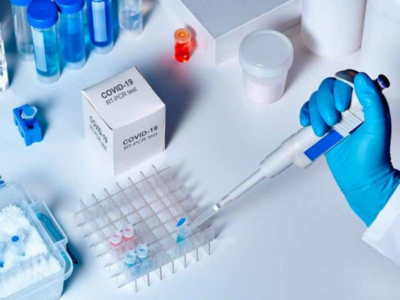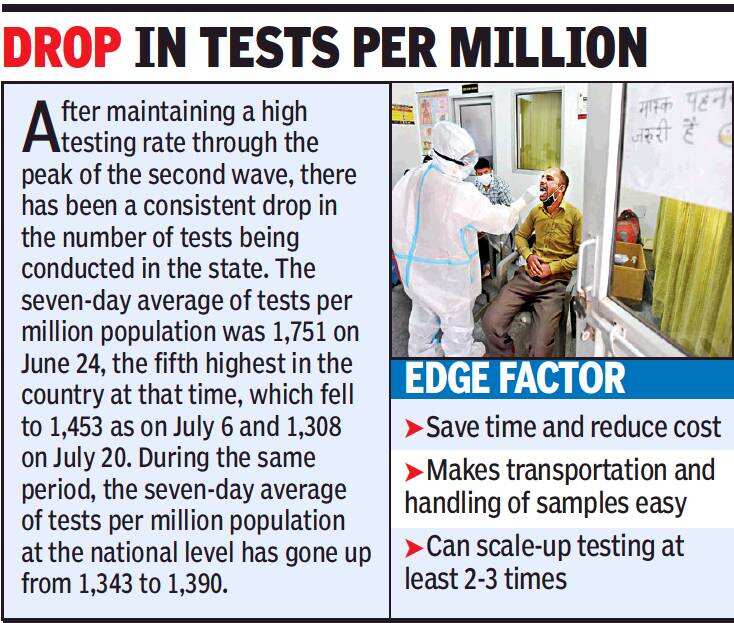- News
- City News
- chandigarh News
- Punjab to use dry swab RT-PCR for high output, fast results
Punjab to use dry swab RT-PCR for high output, fast results

At present, Punjab is using both conventional RT-PCR and rapid antigen tests for detecting Covid (Representative image)
CHANDIGARH: For high throughput Covid-19 diagnostic testing with existing resources and setup, the Punjab government has decided to adopt dry swab-direct reverse transcription polymerase chain reaction (RT-PCR). Testing with this method will begin later this month from Government Medical College in Patiala on a pilot basis.
With the same resources and no additional cost, experts say this method will help test more samples at a quicker pace. At present, Punjab is using both conventional RT-PCR and rapid antigen tests for detecting Covid. The method developed by CSIR-CCMB Hyderabad is said to have a sensitivity of 79% and specificity is 99% in comparison with standard RT-PCR test using viral transport medium (VTM) and RNA extraction.
Instead of using VTM, the method involves collecting and transporting the nasal swab in a dry state, making transportation and handling of the samples easy and less prone to spillage, and spread of infection.

Principal health secretary Hussan Lal maintained that the dry testing method is being adopted on a pilot basis in one district for which training and logistics are being provided to VRDL, Patiala. “Depending upon the results, the method will be introduced in other districts,” he said.
At present, about 40,000 to 45,000 tests are being conducted on an average per day which the government aims to increase further ahead of the much-anticipated third wave of infection.
RT-PCR testing capacity of the state government laboratories has been increased from 26,750 as of January 2021 to 45,500 in July. The government is planning to set up testing labs in all the district hospitals. For being able to conduct 60,000 tests per day, the state government has sought Rs 97.20 crore from the central government.
With the same resources and no additional cost, experts say this method will help test more samples at a quicker pace. At present, Punjab is using both conventional RT-PCR and rapid antigen tests for detecting Covid. The method developed by CSIR-CCMB Hyderabad is said to have a sensitivity of 79% and specificity is 99% in comparison with standard RT-PCR test using viral transport medium (VTM) and RNA extraction.
Instead of using VTM, the method involves collecting and transporting the nasal swab in a dry state, making transportation and handling of the samples easy and less prone to spillage, and spread of infection.

Principal health secretary Hussan Lal maintained that the dry testing method is being adopted on a pilot basis in one district for which training and logistics are being provided to VRDL, Patiala. “Depending upon the results, the method will be introduced in other districts,” he said.
At present, about 40,000 to 45,000 tests are being conducted on an average per day which the government aims to increase further ahead of the much-anticipated third wave of infection.
RT-PCR testing capacity of the state government laboratories has been increased from 26,750 as of January 2021 to 45,500 in July. The government is planning to set up testing labs in all the district hospitals. For being able to conduct 60,000 tests per day, the state government has sought Rs 97.20 crore from the central government.
FacebookTwitterLinkedinEMail
Start a Conversation
end of article
Quick Links
Delhi Air PollutionDelhi TemperatureChennai WeatherBangalore TemperatureCovid vaccination centres in DelhiCoronavirus in DelhiRTPCR test in GurgaonHyderabad RainPollution level in BangaloreDelhi SmogDelhi TemperatureNoida AQIGurgaon AQI todayFire in MumbaiMumbai RainsCovid 19 RT PCR Test in NoidaDelhi AQI todaySrinagar encounter

